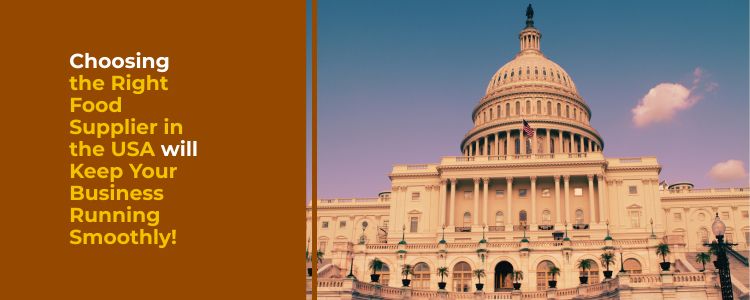How to Choose the Right Food Supplier in the USA (2025 Guide)
The most significant thing a restaurant, department store chain, or food service provider can accomplish is to select the right food supplier. The wholesale food supplier that you choose may have a significant effect on the credibility of your company, client satisfaction, and profit margins in the combative food services sector of nowadays. The risks are greater than ever before in 2025 because of the increasing consumer concerns about environmental sustainability, transparency, and brand authenticity. Selecting a food vendor who matches company values and objectives is essential irrespective of the fact that you have a small coffee shop, a huge restaurant chain, or a store selling groceries. The right partner will assist you in conquering challenges in the company’s development, support the development of your company, and ensure a consistent supply of products.
Finding a trustworthy food supplier across the USA in 2025 involves extensive research and strategic thinking, considering evolving regulations, rising consumer expectations, and modifications in the international supply chain. This blog will highlight how to choose a food supplier in the USA and the primary factors that should be taken care of while identifying the best food supplier.
Acknowledge Your Company's Objectives
Identifying your requirements is essential prior to reviewing available merchants. For example, are you searching for frozen food, any organic product, specific items, dry products, or fresh produce for you? Could you manage bulk orders, or does your business require deliveries on a frequent basis? The specific kind of supply of food that most effectively fits your needs will vary depending on the choices you make, cuisine style, and customers.
In addition, consider expansion, delivery frequency range, and capacity for storage into consideration. In along with addressing your current requirements, an effective supplier should grow with the growth of your business.

Placing Safety in Food and Quality Initially
The FDA (Food and drug administration) and USDA (United States Department of Agriculture) supervise the safety of food regulations in the United States. Your supplier complies with federal, state, and local health requirements and should have the appropriate food handling certifications and follow HACCP (Hazard Analysis and Critical Control Points) procedures for quality control.
You may ask for records, audit summaries, or inspection records. Reputable suppliers ought to be open and eager to disclose their quality assurance procedures and documentation of compliance.
Verify the consistency and quality of the product.
In 2025, customers are more conscious of the sustainability, provenance, and quality of food. Verify that the supplier offers transparent traceability and consistent product quality. To assess freshness, taste, and appearance, request samples or conduct a trial run.
It’s also worth checking if they offer locally sourced, organic, or non-GMO options if these align with your brand values.
Evaluate Delivery and Logistics
Timely and reliable delivery is critical in the food industry. Investigate how the supplier manages inventory, transportation, and scheduling. Do they offer same-day or next-day delivery? How do they handle delays or out-of-stock situations?
In addition, assess their packaging and temperature control methods, especially for perishable items. Technology-driven suppliers now use tracking systems and digital documentation to ensure real-time visibility.
Compare Pricing and Payment Terms
While cost shouldn’t be the only factor, it’s a key consideration. Compare pricing across multiple suppliers, but weigh the value they offer. A cheaper option that leads to poor service or inconsistent quality can cost more in the long run.
Check if they offer flexible payment terms, discounts for bulk orders, or loyalty programs. Transparency in billing and no hidden fees are essential for a long-term partnership.
Assess Customer Service and Communication
A good food supplier should act as a partner. Clear communication, responsiveness to issues, and proactive support go a long way in building trust. Choose a supplier who is available to address your concerns and willing to customize solutions.
Conclusion
In 2025, choosing the right wholesale food supplier in the USA involves more than comparing product catalogs. The Indian agriculture market is expected to reach $473.72 billion by 2029, growing at a 4.90% CAGR between 2024 and 2029. There is a constant demand for Indian products worldwide, which puts the country in 9th position in terms of largest exporters of agricultural products.
It requires a thorough understanding of your operational needs, a strong emphasis on food safety, and a commitment to quality and service. By doing your due diligence and building relationships with trustworthy partners, you can ensure smooth operations and meet the high expectations of today’s consumers.
Inductus Global has maximized the opportunity and has formed a network of wholesale food suppliers to help your agribusiness make its mark in the industry.
We focus on sustainability and quality and offer a wide range of flower seeds, herbs and spices, tea, coffee, dried fruits, nuts, and wheat from trusted vendors. Our top product is rice, sourced from premium rice wholesale suppliers, to cater to the growing needs and assure client satisfaction. All of these are sourced from vendors who comply with GAP (Good Agricultural Practice) standards for sustainable crop production.
Overall, if you wish to source safe, healthy, and quality agricultural products from India, contact us.









